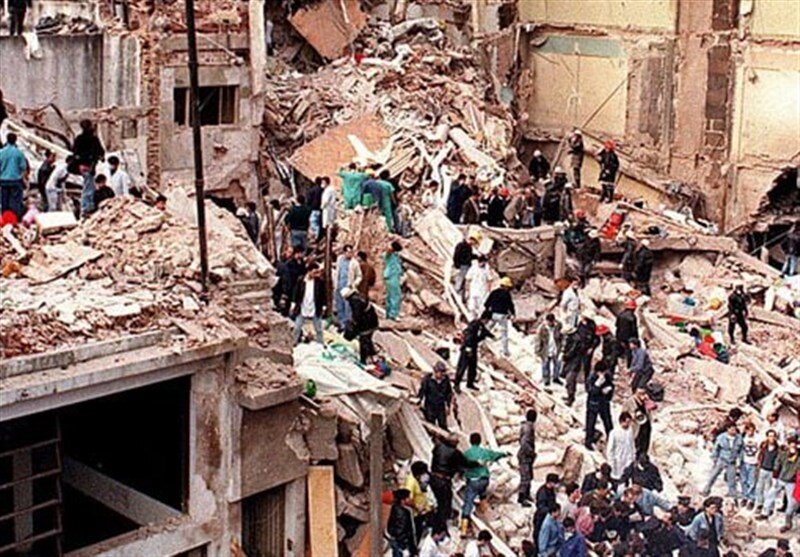AMIA case on the eve of its 30th anniversary

TEHRAN- News sources have quoted a statement by the Argentine President's office announcing that the Argentine government has designated Hamas as a terrorist organization. According to the statement, the president has also ordered the freezing of the properties of the Palestinian group.
The Presidential palace of Argentina highlighted the good relations between Hamas and the Islamic Republic and reiterated its baseless claims about Iran's involvement in the attacks on the Israeli embassy in Buenos Aires and the bombing of the Asociación Mutual Israelita Argentina (AMIA).
As we approach the 30th anniversary of the explosion at the Argentine Zionist Association building in Buenos Aires, it appears that we are on the threshold of a new development after three decades of ambiguity and deviation in the case of a crime.
The crimes seen by a number of experts in the AMIA case were described as "self-harm" of the Jews, or in the opinion of a number of other experts, "revenge and punishment by Carlos Menem's government against the Argentine Zionists."
The handling of the AMIA case in Argentina and the execution of justice to the real perpetrators of the terrorist act, like some other cases in which politicians or political movements are involved, have become a mystery.
The process of dealing with this case has lasted more than 30 years, while during this long period, no technical investigation process has reached a reliable result by police.
According to the admission of the special prosecutor of AMIA, this case consists of millions of pages, but the documents in the case not only don’t help to clarify the hidden angles of the case but also add to its ambiguity and complexity.
While in the initial police investigations, detectives and judicial authorities try to put forward a reliable hypothesis through documentation and try to prove it, 30 years of experience shows that in the AMIA case, the police and judicial authorities have a pre-ordered hypothesis and they are trying to find documents to prove it, which shows that the judicial authorities are not looking to discover the truth in this case. Rather, they are only looking to introduce one who has already been designated as an agent by the political and security institutions.
A few hours after the explosion at the AMIA in Buenos Aires on July 17, 1994, which killed and injured more than 85 people, the Argentine Minister of the Interior, in a hasty comment, while the police investigation had not yet begun, accused the Republic Islamic of Iran of involvement in the explosion. This was the beginning of a story that continues for more than 30 years. Following these accusations, FBI and Mossad reports have also been added to these claims as evidence.
Two major political developments, one in West Asia and the other in Argentina, have caused changes in the AMIA case.
In West Asia, the Al-Aqsa Storm Operation has caused the world to get acquainted with the nature of the Zionist regime. The escalation of protests by governments and people all over the world, including Latin America and even in Argentina, a country that the Zionists have considered as an alternative country after the expulsion from the holy lands of Palestine, has placed the Zionist regime in a position of isolation and discredit.
During the past nine months, the Zionist regime has lost all its prestige in the world, including Latin America. Therefore, the Zionist regime is trying to restore its lost reputation by accusing the resistance forces and the axis of resistance, including Hamas and the Islamic Republic of Iran.
In Argentina, following the ineffectiveness of the left-wing government of Mr. Fernandez, the populist and far-right government of Javier Milei took office with populist slogans.
While respecting the Argentine voters (of course, signs of voter remorse are emerging), the new president of Argentina, who has not hidden his interest in the Zionists and the child-killing Israeli regime, has been on the path of the Zionist regime's anti-Iranian scenario since coming to power and as a puppet of the Zionist regime, he is repeating baseless claims against the Islamic Republic and threatening Iranian citizens.
Regarding the AMIA case, over the past 30 years, Iran has always patiently endured the accusations and still hopes that the political and judicial officials of that country will act with the understanding of their responsibility to discover the truth and try to deal with the deviations created in this case. Iran has also declared its readiness to help discover the truth by maintaining its principled positions while rejecting the hypothetical accusations of Argentine judicial authorities against Iranian nationals.
Unfortunately, instead of looking for credible and reliable partners for the economic salvation of its country and restoring the traditional position of Iran in its business relations, the Argentine government has been placed at the frontline of the anti-Iran scenario of the international Zionist network. While the governments of Latin America are developing and expanding their relations with Iran and taking advantage of the political and economic capacities of Iran as a regional power and an important global player to secure their national interests, the government of Milei, by following the policy of Iran's anti-Zionist actions, endangers Argentina's national interests.
Undoubtedly, Tehran will not forget the anti-Iranian policies of Buenos Aires. But Iran has shown that it does not easily play on the enemy's chess board, but at the right time and right position, it will impose its own game on the enemy and make them regret their enmity with Iran.
